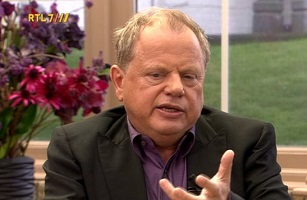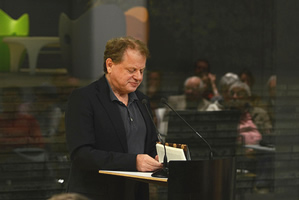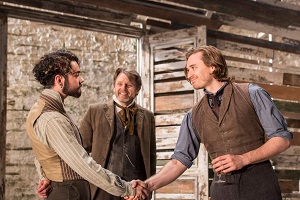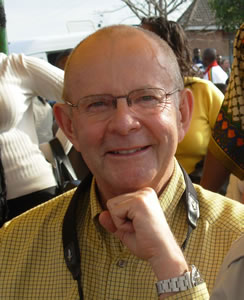De Nederlandse schrijver, essayist, columnist en vertaler Bas Heijne werd geboren op 9 januari 1960 in Nijmegen. Zie ook alle tags voor Bas Heijne op dit blog.
Uit: Onbehagen
“Het bleef oppassen. Geen reden tot tevredenheid. Nooit denken dat het af was.
Maar al die kanttekeningen waren precies dát – oprechte waarschuwingen voor een ál te groot optimisme. Het deed aan de energie van dat optimisme weinig af. Zwartgalligheid werd uitgeleefd in de kunsten, niet in de maatschappij. Doodsdrift was iets persoonlijks, iets voor mensen, meestal jongeren, die tragisch over de rand van de samenleving vielen of zich heroïsch in de afgrond van hun eigen geest stortten.
Maar we wisten welke kant het met de geschiedenis zou op gaan. Of in ieder geval welke kant het zou móéten op gaan.
Mijn eigen mensbeeld raakte gaandeweg donkerder gekleurd. Mijn lievelingsschrijvers werden Fjodor Dostojevski, Joseph Conrad en, misschien verrassend, gezien zijn onterechte dweperige, nostalgische reputatie, Louis Couperus. Dit waren stuk voor stuk romanciers die een diep instinct hadden voor de mens die niet opgewassen was tegen zijn eigen beschaving, de mens die zijn eigen vernietigingsdrang kon maskeren met een hardnekkig vooruitgangsgeloof, de mens die, wanneer hij los kwam te staan van zijn eigen cultuur, ten prooi viel aan destructieve, beestachtige impulsen. In de jaren negentig vertaalde ik Conrads Heart of Darkness, die genadeloze afrekening met het blinde geloof in de menselijke vooruitgang.
Hoe verhielden die schrijvers zich tot het rooskleurige wereldbeeld van mijn jeugd? Waren dat ook slechts kanttekeningen bij het progressieve optimisme dat ik tijdens mijn jeugd met de paplepel kreeg ingegoten – of vormden ze er juist een pijnlijk schril contrast mee? Veroorzaakten ze niet een soort permanente, onoplosbare ambivalentie?
Ging de mens nog wel langer ergens naartoe, of was hij ertoe veroordeeld in kringetjes rond te draaien, in een eindeloze cyclus van streven en desillusie, opbouw en vernietiging, beschaving en barbarij? In hoeverre was een geloof in de idealen van de Verlichting te verenigen met de verzengende verlichtingskritiek van mijn favoriete auteurs?
Zeker was dat ik ervan doordrongen raakte dat de verlangens en emoties die het naoorlogse verlichtingsdenken in mijn jeugd permanent ongeldig had verklaard – nationalisme, groepsdenken, cultuur als een unieke, superieure bedding voor gemeenschapsgevoel – intussen steeds onverbloemder hun plaats in de samenleving terugeisten.”
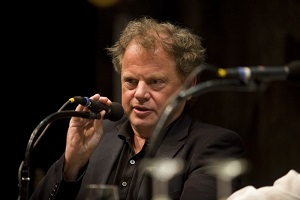
Bas Heijne (Nijmegen, 9 januari 1960)
De Nederlandse schrijver Wessel te Gussinklo werd geboren in Utrecht op 9 januari 1941. Zie ook alle tags voor Wessel te Gussinklo op dit blog.
Uit: De Weergekeerde Bloem
“…plof, tjoek, tjoek, plof, en opnieuw een schok en daarna een paar meter verder rijden en weer met een ruk inhouden zodat ik er bijna af viel; daarna gedempte ploffende geluiden in de uitlaat en opnieuw stond de scooter stil en nu voorgoed. Van alles was hij voorzien deze Heinkel-motorscooter, het botsautomodel van op de kermis (met als motor, de startmotor van de Heinkel-bommenwerpers van Hitler, was mij verteld). Van alles voorzien: oranje richtingaanwijzers vóór en achter, door middel van een knopje op het stuur te bedienen, en een dashboard met snelheidsmeter, kilometerteller, maar geen benzinemeter. Onder de buddyseat zat een peilstok; weer vergeten te kijken, steeds opnieuw overkwam mij dat. Eén liter op veertig kilometer gebruikte dat ding, die machine; als op wind reed hij.
Ik had er wel aan gedacht de laatste dagen: toch even controleren of er nog genoeg benzine is. Maar ach… En verdomd weer opnieuw gestopt, afgeslagen halverwege deze laan; een laan met aan beide uiteinden parken, plantsoenen en zelf ook haast eerder een plantsoen met zijn gazons en bloemperken in het midden, en aan de rand wandelpaden omzoomd door hoge acaciabomen. Daar gestopt, of liever, daar gedwongen te stoppen met afgeslagen motor. De laan waar ik zojuist nog triomfantelijk, zelfs wat lachend en wijzend door gereden was – wat kon mij gebeuren. Boe roepen had ik nog net niet gedaan naar het nieuwe verschijnsel in deze deftige laan uitsluitend bewoond door artsen en hoogleraren en anders jonkheren: homo’s chic voortwandelend op de grindpaden, elegant leunend tegen bomen, voortglijdend tussen de donkere, avondlijke struikjes of verdwijnend in de bosschages van het belendende plantsoen aan de overzijde van een smalle asfaltweg.
Ik had gehoord van deze ontmoetingsplaats en was nu zelf gaan kijken. Tientallen homo’s – waar kwamen die zo plotseling vandaan. Natuurlijk kende ik homo’s – kennissen en verre familieleden – met trippelende pasjes en dunne stemmen gingen zij voort, steeds lachend en ook hun kleren; anderen wezen mij daarop.
Ja ik wist ervan. De keren dat ik liftte en de bestuurder een hand op mijn kruis wilde leggen. Maar even afweren of wat hoofdschudden en weigerend fronsen – minder eigenlijk – was steeds afdoende geweest. De oudere mannen op straat en hun blik die ik plotseling voelde, van geruime afstand naar mij kijkend tussen de anderen door – geen enkele aanleiding was er geweest juist naar mij te kijken; andere mensen, andere voorwerpen waren dichterbij, lagen meer voor de hand – het was of ze mij eruit lichtten, uit het scherm van zichtbaarheden dat hen omringde. Vasthoudend, aandachtig waren die blikken, meer dan zomaar naar iets kijken waar toevallig hun blik op viel, erlangs strijkend en dan weer iets anders. Nee, vasthoudend, oplettend, niet wegglijdend naar het volgende, maar of hun blik mij eruit lichtte, uit al dat gewemel, mij speciaal, alsof ik iets raars aanhad of vreemd liep, of iets anders – scheel, een gek hoofd, wat dan ook. Maar zo was het niet.”
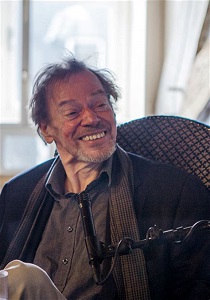
Wessel te Gussinklo (Utrecht, 9 januari 1941)
De Duitse schrijver Benjamin Lebert werd geboren op 9 januari 1982 in Freiburg im Breisgau. Zie ook alle tags voor Benjamin Lebert op dit blog.
Uit: Die Dunkelheit zwischen den Sternen
„Die Sonne lügt. Genauso wie die Nacht. Die Nacht lügt, weil sie verbirgt, ohne ein Unterschlupf zu sein. Die Sonne lügt, weil sie alles herzeigt. Auch das, was gar nicht da ist.
Ich bin froh, wenn das Treffen mit dem Alten vorbei ist. Der Alte ist verschlagen und heckt immer etwas aus. Sein breiter Mund grinst, obwohl es nichts zu grinsen gibt. Er geht mit leisen Sohlen auf Wegen, auf denen er nichts zu suchen hat. Seine Hände nehmen viel und geben wenig. Seine Hände sind kräftig. Seine Hände zittern, wenn sie zuschlagen wollen.
Der Junge weicht mir nicht von der Seite. Der Junge, der Tarun heißt. Bleibt in meiner Nähe. Will unbedingt dabei sein. Der Junge hat den Alten noch nie gesehen, und ich verrate ihm auch nicht, was ich mit dem Alten zu tun habe. Das geht dich nichts an, sage ich. Einfach ein Mann, den ich treffen muss. Mehr nicht. Ich sage ihm, dass er zurückbleiben soll, wenn ich mit dem Alten rede. Dass der Alte nicht mitkriegen darf, dass er zu mir gehört. Weil er es sich sonst anders überlegen könnte. Und ich in Schwierigkeiten komme. Ich sage ihm, dass er nicht wissen darf, wie der Alte aussieht. Weil es nicht gut ist für ihn, wenn er es mit dem Alten zu tun bekommt. Weil es zu gefährlich ist für ihn.
Der Junge hat etwas Grünes an, das ein Brother von weither dagelassen hat. Etwas Grünes mit seltsamer Aufschrift. Ich mag die Sachen nicht, die die Menschen von weither dalassen. Alle bei uns im Haus finden sie schön. Ich finde nicht, dass sie schön sind. Sie sehen lieblos aus. Es macht keinen Unterschied, wer sie trägt. Und man hat dann so ein Gefühl, als wäre es egal, welcher Morgen kommt oder ob man zu den Göttern betet. Manchmal habe ich Angst, dass es wirklich egal ist. Dass wir eh verloren sind. Aber das darf man nicht denken. Man denkt es trotzdem. Unbeabsichtigt. Wenn die Nacht draußen weit ist wie eine schwarze Wüste, die den Hunden gehört, den Hunden und Gaunern. Und wir Kinder dicht an dicht in den Stockbetten liegen. Aber zeigen darf man es nicht, keinesfalls.
Rinki und Prakash dürfen zur Schule gehen. Sie dürfen die Schuluniform anziehen. Das Blau der Uniform ist schön. Die Faltenröcke der Mädchen leuchten schon von weitem, wenn sie nachmittags in Gruppen den Hügel heraufkommen. Helles Blau. Blaues Glück. Ich mag die Farbe Blau. Sie leuchtet in meinen Träumen.“
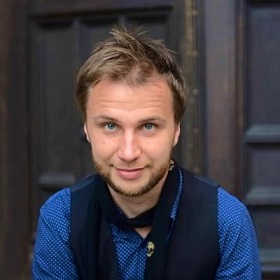
Benjamin Lebert (Freiburg im Breisgau, 9 januari 1982)
De Duitse dichteres en schrijfster Nora Bossong werd geboren op 9 januari 1982 in Bremen. Zie ook alle tags voor Nora Bossong op dit blog.
Rolandslied
Und gingen wir durch meine Mutterstadt
fast lautlos, sprach er nichts, als bliebe es so
ungesagt und lag in diesem Sommertag
ein heißes Flüstern, gab uns kein Baum,
kein Tunnel Schatten, ließ meine Hand von
seiner Hüfte ab und fragte er mich nach
des Laudons Grab – ich weiß nicht, glaub,
er wollte nicht mehr weiter,
mein Vater.
Rattenfänger
Zwei Jungen traf ich
unterm Brückenbogen nachts,
die pinkelten den Pfosten an und
sagten, dass sie sieben seien
sagten, dass sie Läuse hätten.
Sie lachten über mich, als ich
es glauben wollte. Nichts zu holen
außer Läuse, verriet der Kleinere.
Er zeigte aufs Gebüsch und trat
mir auf den Spann. Ich hätt mich gern
in ihn verliebt, so billig war
in jener Nacht sonst nichts mehr
zu erleben. Der Große fragte, ob es stimmt,
dass auch das Tier allein
nicht sterben kann. Es war
zu spät für Jungen unter dieser Brücke.

Nora Bossong (Bremen, 9 januari 1982)
De Nederlandse schrijver, columnist, dichter, scenarioschrijver en radiopresentator Theodor Holman werd geboren in Amsterdam op 9 januari 1953. Zie ook alle tags voor Theodor Holman op dit blog.
De heteluchtballon
Eindelijk brak de feestdag aan.
’s Morgens vroeg werd ik van huis gehaald.
Of ik maar even mee wou gaan.
Een krans, waarvoor veel was betaald
Hing om mijn dungeworden nek.
Men droeg mij door een vlak stuk land.
Honderden mensen stonden achter een hek,
Honderd anderen moesten aan de kant.
Als een kolossale tweede zon
Zag ik te midden van het veld
Een oranje heteluchtballon
Waarop mijn naam; ik was een held.
Een man met een grote hoge hoed
Gebood beleefd, maar zeer beslist
Men deed alles met grote spoed)
Dat ik moest liggen in een kist
Die onder de ballon verborgen was.
Snel klapte men het deksel dicht!
Men zorgde zelfs voor het warme gas;
Ik werd lichter nog dan vederlicht.
Slechts hoorde ik het ploffen
Der laatste zakken zand.
Hoog in de lucht verstond ik nog:
‘Nu pas is hij echt opgebrand.’
Mijn neefje
Ik heb een neef die reist de wereld rond
In ’n zelfgefabriceerde vliegmachiene.
(Twee houten vleugels wieken ‘m van de grond.
Verder verbruikt mijn neefje kerosine,
Die hem door ’n buis anaal wordt toegediend.
Tussen zijn tanden klemt hij een propeller.
Het geval heeft nimmer een prijs verdiend:
’t Miste een goede kilometerteller.)
Laatst was er paniek; neef bleek onvindbaar.
Men vermoedde dat hij was neergestort.
Maar tussen kannibalen en halfgaar,
Zag men hem engels walsen in een kort
Maar ongemeen aantrekkelijk tutuutje,
Ontworpen uit zijn tule parachuutje.
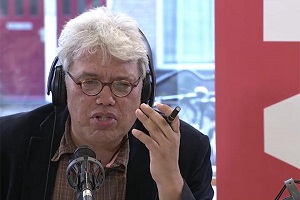
Theodor Holman (Amsterdam, 9 januari 1953)
De Noordierse schrijver en journalist Danny Morrison werd geboren op 9 januari 1953 in Belfast. Zie ook alle tags voor Danny Morrison op dit blog.
Uit: Then The Walls Came Down
“Sunday, 30th December
Well, we were spoilt on Christmas day – lots of food, lots of variety, but it was all institutional and suffered from an insipidness and lack of personal touch. Later, we watched ‘ET’ in the canteen and then had our party. Two lads painstakingly made party hats. I presented the ‘Mister and Mister’ competition, during which each contestant was tested for intimate knowledge of his cell mate whilst his mate sat in a far corner, wearing headphones blaring out pop music.
Some of the more harmless questions were: What is your partner’s greatest fear or phobia: (a) Spiders, (b) mice, or (c) getting Judge Carswell? How often does your cell-mate pray: (a) once a week, (b) once a day or (c) he’s never off his knees? How many IRA operations has he claimed to have been on: (a) none, (b) between 1 and 5, (c) more than 5 or (d) more than Martin Meehan? What was his reaction to the IRA ceasefire: (a) it should never have happened, (b) it should have lasted 7 days or (c) they should never have called off the last one? How many Christmas cards did he get: (a) between 1 and 30, (b) between 30 and 60, or (c) more than Pat – I love me, who do you love – Sheehan?
7.30 pm
I am not long back from the canteen and as I was coming out Dermot Carroll told me that on the 7 o’clock news there was a report of the Brits having shot dead a man and seriously wounded his brother at a checkpoint in South Armagh. So I wonder what all that is about. We’ll find out tomorrow.
Weather-wise you haven’t missed anything. Out in the yard this morning we crunched through a dusting of snow upon frost. A stormy cold wind was ripping the air apart and the starlings kept trying to find roosting spots on the disused chimney stack but broke up in disarray and went crashing through the air. Anto told us a funny story as we were walking. Years ago, around Christmas, he and three mates (labourers and an electrician) all went to the old Hunting Lodge after work. One of them bet the others that he could steal a stag trophy off the wall without being caught. They placed their bets. The aspiring thief went to the bar and asked for a couple of plastic carry-out bags. In two moves he had the stag’s head off the wall and under the table, and its antlers covered over with the bags. Then he put the head under his coat and they all walked out, caught a black taxi to Twinbrook and got out opposite the Hitchin Post where the two who lost the bet went to buy a real carry-out. When the two emerged from the bar there was a small crowd gathered behind their mates. Anto’s mate had removed the bags and stuck the stag’s head on a hedge, tied an electric wire around its neck like a rope and pretended to be struggling with it!”
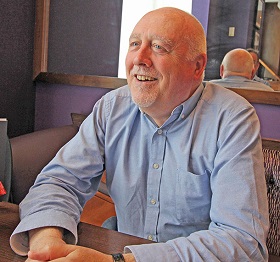
Danny Morrison (Belfast, 9 januari 1953)
De Ierse schrijver Brian Friel werd geboren op 9 januari 1929 geboren in Omagh, Noord-Ierland, in een katholiek onderwijzersgezin. Zie ook alle tags voor Brian Friel op dit blog.
Uit: Dancing at Lughnasa: A Play
“CHRIS But you’d walk out on me again. You wouldn’t intend to but that’s what would happen because that’s your nature and you can’t help yourself.
GERRY Not this time, Chrissie. This time it will be –
CHRIS Don’t talk any more; no more words. Just dance me down the lane and then you’ll leave.
GERRY Believe me, Chrissie; this time the omens are terrific! The omens are unbelievable this time!
They dance off. After they have exited the music continues for a few seconds and then stops suddenly in mid-phrase. Maggie goes to the set, slaps it, turns it off. Kate moves away from the window.
KATE They’re away. Dancing.
MAGGIE Whatever’s wrong with it, that’s all it seems to last – a few minutes at a time. Something to do with the way it heats up.
KATE We probably won’t see Mr Evans for another year – until the humour suddenly takes him again. AGNES He has a Christian name.
KATE And in the meantime it’s Christina’s heart that gets crushed again. That’s what I mind. But what really infuriates me is that the creature has no sense of ordinary duty. Does he ever wonder how she clothes and feeds Michael? Does he ask her? Does he care?
Agnes rises and goes to the back door.
AGNES Going out to get my head cleared. Bit of a headache all day.
KATE Seems to me the beasts of the field have more concern for their young than that creature has. Agnes Do you ever listen to yourself, Kate? You are such a damned righteous bitch! And his name is Gerry! – Gerry! -Gerry! (Now on the point of tears, she runs off.)”
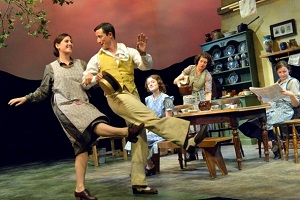
Brian Friel (9 januari 1929 – 2 oktober 2015)
Scene uit een opvoering in Keswick, 2014
De Franse schrijfster Simone de Beauvoir werd geboren op 9 januari 1908 in Parijs. Zie ook alle tags voor Simone de Beauvoir op dit blog.
Uit: Tous les hommes sont mortels
“– C’est un homme très extraordinaire, dit-elle.
– C’est un fou, dit Roger.
– Non. C’est plus curieux. Il vient de m’apprendre qu’il est immortel.
Elle les examina avec mépris; ils avaient l’air stupide.
– Immortel ? dit Annie.
– Il est né au XIIIème siècle, dit Régine d’une voix impartiale. En 1848, il s’est endormi dans un bois et y est resté soixante ans, ensuite il a passé trente ans dans un asile.
– Cesse ce jeu, dit Roger.
– Pourquoi ne serait-il pas immortel ? demanda-t-elle avec défi. Ça ne me semble pas un plus grand miracle que de naître et de mourir.
– Oh ! je t’en prie, dit Roger.
– Et même s’il n’est pas immortel, il se croit immortel.
– C’est un classique délire de grandeur, dit Roger. Ça n’est pas plus intéressant qu’un homme qui se croit Charlemagne.
– Qui te dit qu’un homme qui se croit Charlemagne n’est pas intéressant ? dit Régine.
Brusquement la colère lui monta au visage.
– Croyez-vous que vous êtes si intéressants, vous deux ?
– Vous n’êtes pas polie, dit Annie d’un ton vexé.
– Et vous voudriez que je vous ressemble, dit Régine. Et je me suis mise à vous ressembler !
Elle se leva, marcha vers sa chambre, et claqua la porte derrière elle. « Je leur ressemble », dit-elle avec fureur. Petits hommes. Petites vies.
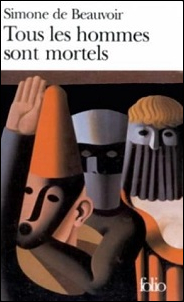
Simone de Beauvoir (9 januari 1908 – 14 april 1986)
Cover
De Duitse dichter, schrijver, columnist en journalist Kurt Tucholsky werd geboren in Berlijn op 9 januari 1890. Zie ook alle tags voor Kurt Tucholsky op dit blog.
An das Baby
Alle stehn um dich herum:
Fotograf und Mutti
und ein Kasten, schwarz und stumm,
Felix, Tante Putti…
Sie wackeln mit dem Schlüsselbund,
fröhlich quietscht ein Gummihund.
“Baby, lach mal!” ruft Mama.
“Guck”, ruft Tante, “eiala!”
Aber du, mein kleiner Mann,
siehst dir die Gesellschaft an…
Na, und dann – was meinste?
Weinste.
Später stehn um dich herum
Vaterland und Fahnen;
Kirche, Ministerium,
Welsche und Germanen.
Jeder stiert nur unverwandt
auf das eigne kleine Land.
Jeder kräht auf seinem Mist,
weiß genau, was Wahrheit ist.
Aber du, mein guter Mann,
siehst dir die Gesellschaft an…
Na, und dann – was machste?
Lachste.
Kritik
Da oben spielen sie ein schweres Drama
mit Weltanschauung, Kampf von Herz und Pflicht:
Susannen attackiert ein ganz infama
Patron und läßt sie nicht.
Ich sitze im Parkett und zück den Faber
und schreibe auf, ob alles richtig sei;
Exposition, geschürzter Knoten – aber
ich denk mir nichts dabei.
Mein Herz weilt fromm bei jenem lieben Kinde,
das lächelnd eine Kindermagd agiert:
ich streichle ihr im Geiste sehr gelinde,
was sie so lieblich ziert.
Nun sieh mal einer diese süßen Pfoten,
dies Seidenhaar mit einem Häubchen drauf –
es gibt da sicher manch geschürzten Knoten:
ich löst’ ihn gerne auf.
Wer sagte da, daß ich nicht sachlich bliebe?
(Nu sieh mal einer dieses schlanke Bein!)
Begeisterung, Freude am Beruf und “Liebe” -:
So soll es sein!
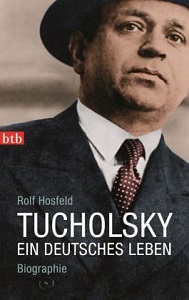
Kurt Tucholsky (9 januari 1890 – 21 december 1935)
Cover biografie
Zie voor nog meer schrijvers van de 9e januari ook mijn blog van 9 januari 2016 deel 2 en eveneens deel 3.

